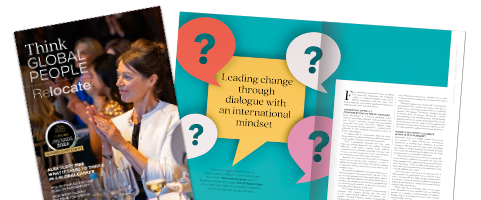How companies can encourage women into senior roles in the global workplace.
Given the global talent shortages, what steps can companies make to spot talent earlier and encourage more women and minorities into senior roles?
Marianne Curphey reports.
Employers are grappling with the global talent crisis, the demand for hybrid working and the retirement of older and more experienced workers. Many are looking for new ways to promote and develop a more diverse workforce but are held back by a culture which limits opportunities for women and minorities.
For example, the traditional route to C-suite and senior management role recruitment may disadvantage women who have not necessarily been promoted to the jobs that are seen as preparation for CEO and leadership roles. In addition, the benefit of mentoring and personal development, which can help propel recipients up the career ladder, is often reserved for a small number of senior managers.
Yet spotting talent early and promoting women and people from different backgrounds can help futureproof an organisation, fulfil Diversity & Inclusion (D&I) objectives and more accurately reflect the spread of clients and customers in the wider community.
Being able to demonstrate a clear commitment to D&I will also help meet growing demands from customers, shareholders or stakeholders who want to do business with more equitable organisations. Diversity in leadership teams can avoid groupthink, bring fresh ideas and create higher levels of profitability in the long term, research has shown.
“As we move further from the pandemic, mobility and overseas assignments will return,” says Teresa Phiri, Consultant at international executive search firm Perrett Laver. “Particularly when working in challenging or remote environments, it is important that an organisation’s talent recruitment strategy aligns with global mobility efforts. Providing workplace support such as mentorship and leadership development programmes – even when employees are not based in a physical office – will also be key to not just attracting but retaining the best talent,” she says.
How can organisations encourage women to take up senior globally mobile roles
“Increasing the breadth and depth of the talent pool via flexible and non-linear career pathways will futureproof an organisation and widen the talent pool of wellrounded, agile leadership talent,” says Rachel Davis Co-Managing Director at Armstrong Craven, a global leader in research-driven talent solutions.

“This visibility applies externally as well as internally and therefore it is not just stakeholders and shareholders who will ultimately benefit, but customers,” she says.
Customers are increasingly discerning in their choice of companies and brands who are actively ‘doing the right thing’.
What’s more, the global shortage of talent and the high demand for new skills means companies must now turn their attention to reskilling their existing workforce, opening up new opportunities for talent to put themselves forward for new roles.
This agile talent in time will be more well-rounded and therefore will possess a broader set of skills and experiences better suited to leadership.
A true commitment to social impact needs to be in place beyond the recruitment process. This involves female talent being properly nurtured on a continuous basis.”
Lewis Maleh, Executive Recruitment Expert and CEO of Bentley Lewis
“There is a real opportunity for HR to open up new pathways and remove the idea that the only way to obtain promotion is via a vertical straight line,” she says.
“Organisations are missing a massive opportunity when it comes to female talent,” says career coach Natalie Trice. “All too often women leave the workforce simply because they support isn’t in place and the challenge of navigating corporate life adds to an already full cup and stressful life.”
Career Mentoring For Women need to be continuous, not a token gesture
Lewis Maleh, executive recruitment expert and CEO of Bentley Lewis, an award-winning global boutique executive search firm, says companies need to work harder to explain what they are promising while interviewing candidates.
“A true commitment to social impact needs to be in place beyond the recruitment process,” he says. “This involves female talent being properly nurtured on a continuous basis.”
The pandemic sped up the movement towards increased hybrid and remote work.
The increase in hybrid and remote work opportunities helped level the playing field for women, particularly those with children.
Having female mentors who have shown they can succeed at the C-suite level can help inspire a new generation of women to follow their career aspirations and fulfil their potential.”
Teresa Phiri, Consultant at international executive search firm Perrett Laver
“Having women in senior leadership roles should be a priority for leaders to promote having diverse perspectives in leadership teams,” he says.
“The rise in remote work has opened up a global workforce and expanded the talent pool. Companies are beginning to realise that in order to access and attract top talent, this may mean recruiting globally, increasing diversity in our organisations. Competing for talent is also becoming more challenging, as job seekers can search globally for roles which suit them.”
Organisations need to be flexible when designing roles and Lewis Maleh says that with the significant rise in employers offering flexible models of work, people are no longer as willing to accept positions that don’t accommodate their needs. It is an employee market, and companies need to demonstrate their commitment to employee satisfaction.
Firms need to examine their own unconscious bias in the recruitment process for globally mobile roles.
Research from the House of Commons this year showed that companies with more female leaders outperform those dominated by men. In addition, having more senior female leaders tends to have a similar effect throughout the organisation with female leaders serving as mentors, role models, and changing organisational policies to benefit both men and women as well as attracting a more diverse workforce.
Teresa Phiri at Perrett Laver says there are, however, still common perceptions that women have less leadership potential than men.
“We need to address misconceptions like this urgently, as they continue to hold women back from progressing within their organisation,” she says.
“They are also a barrier to firms recruiting female talent, as interviewers can bring these views with them when assessing candidates, even if they have succeeded in attracting diverse talent to apply for the role. Organisations which succumb to unconscious biases are therefore missing the opportunity to attract, retain and promote female leaders.”
To address this, organisations must create an open and diverse hiring process. From an executive search perspective, this means looking beyond immediate networks and recruiting pools and discarding traditional assumptions of what makes a senior leader successful.
“It is important to use inclusive language on the job description and in the interview room,” she explains.
“Women leaders are more likely to leave their roles due to the desire for greater flexibility, mental health support or Diversity, Equity and Inclusion (DEI). Organisations which foster workplace processes which supports DEI policies can therefore encourage women to stay and help them succeed in their roles.”
She recommends mentorship programmes as a key strategy to encourage women in the early stages of their career. Bespoke mentorship can help women not only grow in their skills but their self-belief to take on day to day organisational challenges.
“Having female mentors who have shown they can succeed at the C-suite level can help inspire a new generation of women to follow their career aspirations and fulfil their potential,” she says.
What’s Next in the Workplace for Women and Why Is D&I So Important?
Teresa Phiri says women are seeking better work culture and organisations risk losing significant proportions of their talent if they lack strong diversity and inclusion policies and practices.
Research from McKinsey has found that women are more than one and a half times as likely as men in the same roles to have left a previous job because they wanted to work for a company that was more committed to diversity, equity and inclusion (DEI).
“Positively, this indicates that the next generation of female leaders will play a key role in building company values and shaping policies that support DEI and wellbeing,” she says.
Increasing the diversity of
management has been shown to impact on a company’s profitability and performance”
Teresa Phiri, Perrett Laver
“Increasing the diversity of management has been shown to impact on a company’s profitability and performance.” Leaders should embody the values of inclusion to challenge the status quo. A report from the Fawcett Society and Runnymede Trust revealed that 75% of women of colour have experienced racism in the workplace, with over one in five having suffered racial slurs during their career.
“We can clearly see that organisations are doing much more to tackle racism and discrimination of allforms but more still needs to be done,” she says. “From setting up employee network groups and resources to ethnicity pay reports, employers must continue to lead from the front to ensure racism has no place in business – or society.”
She says most talent teams have changed their approaches to revers assumptions of what candidates should look like. Now, anonymous recruitment is a common practice to get the best talent irrespective of age, gender, ethnicity or any other characteristic.
“It is vital that organisations challenge any preconceptions they may have when reviewing CVs and applications,” she says. “While a potential candidate might not have gone to the most prestigious university or received the best degree, they may have other skills which suit that role.
Save the date
The Innovation Festival for Global Working
Join us on 8 June 2023 in Kent, UK


 Magazine
Magazine


